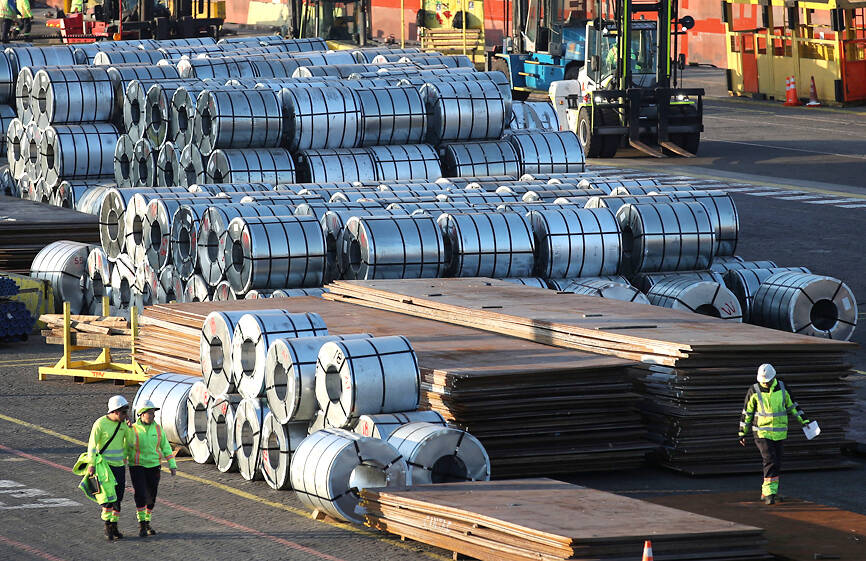China Steel Corp (CSC, 中鋼), Taiwan’s largest integrated steelmaker, swung into a loss in the first half of this year as it remained in the red for a third consecutive month last month.
Its pretax loss was NT$1.57 billion (US$53.3 million) from January to last month, an unfavorable result compared with a pretax profit of NT$3.498 billion for the same period last year, the company said in a statement on Friday.
The first-half result reflected a slump in operating income due to decreases in revenue, sales volume and average selling prices of its steel products, as US tariffs and local currency’s appreciation kept downstream clients sidelined, the company said.

Photo: Reuters
Additionally, lower dividends from the company’s mining investments also caused a decline in nonoperating income, it said.
The company said its cumulative revenue totaled NT$168.27 billion in the first half of the year, down from NT$188.33 billion during the same period last year, with shipments of 3.78 million tonnes, also down from 3.96 million tonnes the previous year.
Although global trade, consumption and investment confidence are still at a low level, CSC said it is cautiously optimistic about the outlook for the second half of this year.
That is because market uncertainty continues to ease since the US has started notifying its trading partners of tariff rates, the company said in the statement.
The end-market demand is also expected to gradually emerge, given a positive outlook for its downstream partners in Taiwan amid strong demand for emerging technologies, such as artificial intelligence and high-performance computing, it said.
Furthermore, China recently announced that it would begin construction of the world’s largest hydropower dam in Tibet, which is expected to boost steel demand for infrastructure, the company said
This might help balance steel production and sales, and lead the market out of the trough earlier, the company added.

NEW IDENTITY: Known for its software, India has expanded into hardware, with its semiconductor industry growing from US$38bn in 2023 to US$45bn to US$50bn India on Saturday inaugurated its first semiconductor assembly and test facility, a milestone in the government’s push to reduce dependence on foreign chipmakers and stake a claim in a sector dominated by China. Indian Prime Minister Narendra Modi opened US firm Micron Technology Inc’s semiconductor assembly, test and packaging unit in his home state of Gujarat, hailing the “dawn of a new era” for India’s technology ambitions. “When young Indians look back in the future, they will see this decade as the turning point in our tech future,” Modi told the event, which was broadcast on his YouTube channel. The plant would convert

‘SEISMIC SHIFT’: The researcher forecast there would be about 1.1 billion mobile shipments this year, down from 1.26 billion the prior year and erasing years of gains The global smartphone market is expected to contract 12.9 percent this year due to the unprecedented memorychip shortage, marking “a crisis like no other,” researcher International Data Corp (IDC) said. The new forecast, a dramatic revision down from earlier estimates, gives the latest accounting of the ongoing memory crunch that is affecting every corner of the electronics industry. The demand for advanced memory to power artificial intelligence (AI) tasks has drained global supply until well into next year and jeopardizes the business model of many smartphone makers. IDC forecast about 1.1 billion mobile shipments this year, down from 1.26 billion the prior

People stand in a Pokemon store in Tokyo on Thursday. One of the world highest-grossing franchises is celebrated its 30th anniversary yesterday.

Zimbabwe’s ban on raw lithium exports is forcing Chinese miners to rethink their strategy, speeding up plans to process the metal locally instead of shipping it to China’s vast rechargeable battery industry. The country is Africa’s largest lithium producer and has one of the world’s largest reserves, according to the US Geological Survey (USGS). Zimbabwe already banned the export of lithium ore in 2022 and last year announced it would halt exports of lithium concentrates from January next year. However, on Wednesday it imposed the ban with immediate effect, leaving unclear what the lithium mining sector would do in the